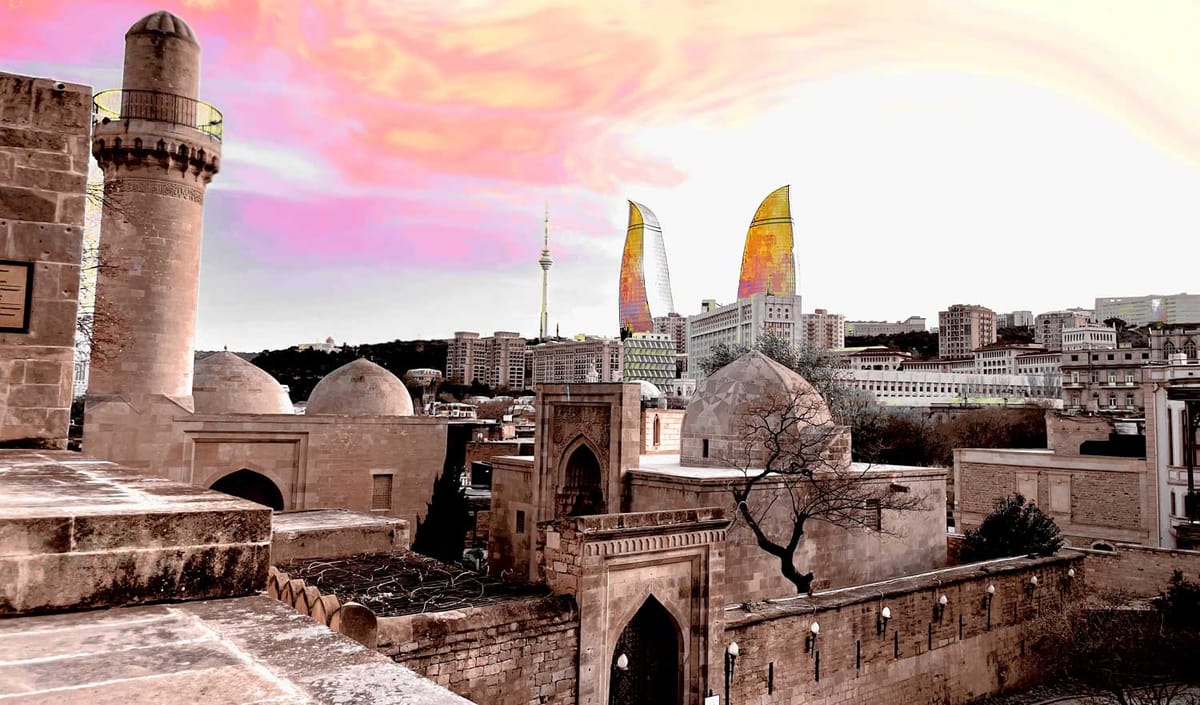War, peace and energy in the land of fire
DISPATCH FROM BAKU: Can a ‘green corridor’ of energy trade heal deep wounds in the South Caucasus?

They say that peace and prosperity go hand in hand. But Azerbaijan, the small South Caucasus country transformed by Caspian oil riches, proves you can have one without the other.
An influx of petrodollars since the early 2000s propelled Azerbaijan from post-Soviet backwater into a regional economic and military powerhouse. Azerbaijan’s armed forces decimated neighbouring Armenia in a series of stunning and decisive offensives between 2020 and 2023 that reasserted Baku’s control over the Nagorno-Karabakh region and occupied territories.
The two countries are technically still at war, although the Azeri people want to believe otherwise. Azerbaijan’s battlefield successes “settled” the issue, residents of Baku will impress upon you. Ilham Aliyev, Azerbaijan’s autocratic president, says the warring nations are “closer to peace than ever before” — a wishful line parroted by charming Azeri politicians in Azerbaijan’s chic and ostentatious capital.
Oil wealth oozes from every corner of the city. Glass-fronted skyscrapers soar over an immaculate Caspian seaside boulevard dotted with enticing Persian-Anatolian eateries. The picturesque cobbled streets of the painstakingly restored old town send a very clear message: energy trade brings wealth, power and regional dominance.
For Armenia, the situation is dire. Aside from so much else, the decades-long conflict cost Armenia the opportunity to become a transit country for Caspian hydrocarbons. Lucrative transit fees instead went to Georgia and Turkey, leaving Armenia economically isolated. Politically too the country is adrift after being abandoned by long-time ally Russia.
Now, Azerbaijan’s upcoming presidency of COP29 is throwing a spotlight on the South Caucasus and its untapped renewables potential. Ministers in Baku want to promote the idea of a ‘green peace corridor’ — an electricity interconnector that unites feuding neighbours around a shared undertaking: to export pan-Caucasian wind and solar power to premium markets in Europe.
European leaders are keen on the idea. Green infrastructure that forges an enduring peace deal while diversifying European energy sources and decarbonising coal-heavy Balkan power grids is a win-win-win. But there’s a catch: cross-border cooperation and investment won’t happen without a lasting diplomatic accord between Baku and the Armenian capital of Yerevan.
This is a region still processing the harrowing fallout from decades of failed diplomacy and armed conflict. Armenia last week alleged Azerbaijan undertook “ethnic cleansing” and destroyed Armenian cultural heritage in Nagorno-Karabakh. Baku says Armenia’s 30-year occupation of territories on the Iranian border left the region contaminated with mines and toxic pollutants. Both sides accused each other of violating the terms of a ceasefire agreement during a cross-border skirmish in early April, prompting G7 leaders to weigh in.
Against this backdrop, what chance is there that the distant promise of green export riches will focus minds at heated peace talks?
Zoom out, and the picture becomes more nuanced. Azerbaijan might have won the war, but it still needs to cooperate with Armenia to win the peace — and there are some encouraging signs on that front. In parallel, the COP29 host is embracing renewables to diversify its fossil fuel-reliant economy and free up natural gas for export. An initial 2 GW of wind and solar is due online by 2027, but expansion beyond that requires access to premium export markets — and Armenia, to an extent, stands between them.
Looking wider still, Azerbaijan and Armenia sit at the gateway between east and west. An enduring peace settlement could open a vital new trade corridor between energy-poor Europe and energy-rich landlocked Central Asia. With war raging in Ukraine, nations on both sides of the gateway are keen to unlock the opportunity — putting the issue of Azerbaijan-Armenia relations at the heart of geostrategic Eurasian energy and climate considerations.
When it comes to energy geopolitics, the South Caucasus is one of the world’s most complex regions to unpick. This (rather long) special dispatch from Baku analyses the oil, gas and renewables outlook for Azerbaijan, and the sensitivities of developing energy flows across borders still bristling with tension. The region tends to fly under the radar of energy observers, but high-stakes peace talks could determine the energy future of the South Caucasus and, by extension, Europe.
Here’s an overview of the article structure and main themes:
- Pain-points along the peace powerline
- Tensions in Zangazur, the key Caucasian trade corridor
- Baku’s green dream crimped by the grid
- Renewables force the market reform issue
- Caspian wind exports — electrons or molecules?
- Is Azerbaijan facing a gas crunch?
- Caspian oil’s last hurrah
- Trans-Caspian connection, with a green twist
- Resurrecting the old Silk Road to blaze a trail to Baku
- Time for another Caucasian energy infrastructure miracle
Researching this article involved six flights over two weeks of travel, many hours of interviews, reams of notes and a fair bit of data wrangling. To gain access, please consider taking out a paid subscription and support independent energy journalism
Article stats: 4,200 words, 20-min reading time, 12 charts, graphics, videos & photos

Member discussion: War, peace and energy in the land of fire
Read what members are saying. Subscribe to join the conversation.





